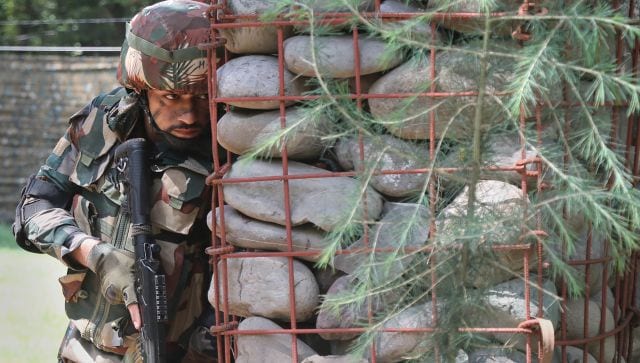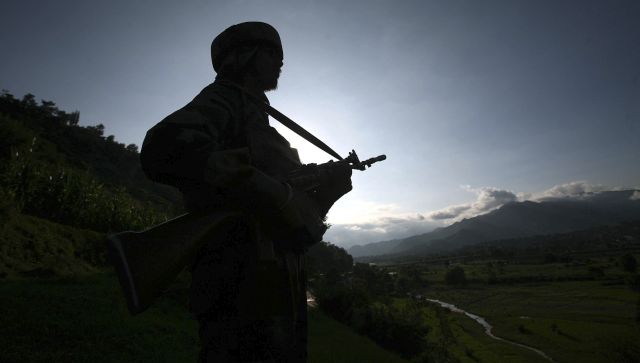A surgical strike or an infiltration bid? What happened between Indian Army and Pak terrorists?

An Indian army soldier patrols along the Line of Control between India and Pakistan border in Poonch district. The defence ministry has denied reports of a surgical strike in PoK. File photo/PTI
Pakistan continues to harbour terrorists and India is often at the receiving end. Now reports have emerged that the Indian Army conducted a surgical strike across the Line of Control (LOC) to destroy four launching pads of terrorists in Pakistan-occupied Kashmir. However, the Indian government has refuted the claims.
The report, published in a newspaper, said that the Indian soldiers entered 2.5 kilometres across the LoC from Rajouri and Poonch districts of Jammu and Kashmir (J&K) on Saturday night.
However, the Indian Army and Ministry of Defence have denied the report. The government said that the Indian Army foiled an infiltration bid along the LoC in J&K’s Balakote sector. It emphasised that it was not a surgical strike as reported in the daily.
What did the newspaper report?
According to a report in the Hindi newspaper, seven to eight terrorists were killed in the operation, which is dubbed a surgical strike by India. All Indian soldiers returned safely after the mission.
The strike was reportedly carried out in Nakyal, Kotli in PoK after Indian security agencies received specific information about plans for a terror attack in Poonch and Rajouri districts. The movement of the Pakistani army, its intelligence agency Inter-Services Intelligence (ISI) and the Pakistan Border Action Team had increased at the launching pads, the newspaper reported.
The Indian Army, it said, had not confirmed the surgical strikes. Pakistan too has been silent about it.
What is the Indian government saying?
Refuting the newspaper report, the defence ministry said that two terrorists were detected by alert troops attempting to cross the LoC onto the Indian side, “making use of inclement weather, dense fog, thick foliage, and undulating ground in Hamirpur area of Balakote Sector”.
“Intelligence Inputs received from multiple intelligence agencies and Jammu and Kashmir Police revealed the presence of terrorists waiting to cross the LC from opposite own Balakote Sector. Based on these inputs own surveillance grid was placed on heightened alert and multiple ambushes were sited at suitable location,” the ministry’s statement read.

According to the ministry, the terrorists were challenged and then engaged with effective fire as they approached India’s ambush sites. This forced them to flee by making use of weather and ground conditions.
“However effective fire resulted in one terrorist falling down on the ground near the LC. Additional troops were then moved into the area and search operations commenced in the afternoon after improvement of weather conditions and visibility,” it said.
Searches were conducted during which the Indian Army discovered an AK 47 rifle with two magazines, 30 rounds, two grenades, and Pakistan-origin medicines, reports News18. Blood trails leading towards the LoC were also found.
“As per intelligence Inputs the two terrorists who attempted to infiltrate were injured due to fire from own troops but still managed to return across the LC and later they succumbed to their injuries,” the statement by the ministry added.
The Indian Army continues to remain on alert and maintain vigil to foil any attempts of infiltration in the region.

How common are surgical strikes?
The term ‘surgical strike’ entered the popular lexicon in 2016. On 28 September 2016, the Indian Army launched surgical strikes on terrorist camps in PoK. It was in response to an attack by Pakistan-based terrorists on an army base in Kashmir’s Uri on 18 September. Nineteen soldiers were killed and 30 others were injured.
In an interview with the news agency ANI, Prime Minister Narendra Modi said that the surgical strikes were planned as there was a “rage” building up within him and the Indian Army after soldiers were killed in Uri.
On 26 February 2019, Indian Air Force carried out airstrikes in Pakistan’s Balakot. This came 12 days after a convoy of vehicles carrying CRPF personnel was attacked by a suicide bomber in J&K’s Pulwama district, killing 40.
In retaliation, the IAF destroyed a terror training camp of Jaish-e-Mohammed, the group that planned the Pulawama attack.
In March 2019, Defence Minister Rajnath Singh (then home minister) said that India had carried out three cross-border strikes in five years. While the 2016 surgical strike and the 2019 Balakot airstrike are known to the public, Singh did not reveal the third.
With inputs from agencies

Atul Tiwari is a seasoned journalist at Mumbai Times, specializing in city news, culture, and human-interest stories. With a knack for uncovering compelling narratives, Atul brings Mumbai’s vibrant spirit to life through his writing.





